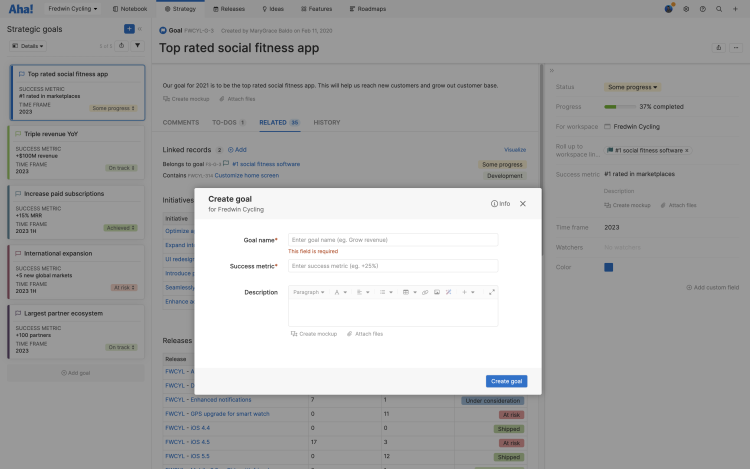Aha! Roadmaps | Goals
Goals are measurable results that will help you achieve your strategic vision. They should be attainable within a fixed time frame, typically 3–12 months, and should represent the critical accomplishments required to make your vision a reality.
Any team using Aha! Roadmaps can have its own strategy and its own goals. Your team's goals might look like these:
Increase revenue by 30% in the next 12 months.
Maintain a support ticket first-response time of less than an hour in Europe in Q3.
Rank #1 in organic searches for a variety of market-leading keywords.
Raise the trial-to-paid conversion rate by 5% in the second half of the year.
You can link goals in Aha! Roadmaps to the high-level efforts focused on achieving them, called initiatives. You can also link goals to the everyday work your team completes. This lets everyone on your team know why the work they do matters.
Click any of the following links to skip ahead.
Add goals
To add a goal, navigate to Strategy Goals. If you have not entered any goals yet, Aha! Roadmaps will prompt you to do so. To add a new goal, click Add goal. Enter the goal name, an optional description, and the success metric of your new goal.

Filter, chart, and compare goals
The Strategy Goals page has two views.
The Detail view shows you the details of any goal you select. Use this view to edit a goal's details or to dig into records attached to a goal.
The Chart view shows you a visual graph of your goals so that you can compare them to each other by any two metrics that you choose.
In the Chart view, drag your goals to compare them as they relate to each other. Click on the existing default labels and axis values on the grid to edit them and type in the new value or metric. Customize this text to use terminology that fits how you want to map them.
At the top of either view, you will see filters that allow you to focus your view on goals from a certain time frame or a status.
Use the Change view type dropdown in the upper-left to switch between your two views. Any filters you have set will apply to your new view type, so you never lose your focus.
Set time frames for your goals
Time frames allow teams focusing on strategic planning to group their goals and initiatives based on the time frame associated with their strategic execution.
This is especially important for teams that kick off the year with strategic plans divided into quarterly or half-year objectives. It allows the team to plan out their year-long strategy upfront. Then they can group related goals and initiatives together in the time frames they will be delivered in for easy reporting and filtering across the application.
To keep the list of available time frames organized and current, you can merge or archive time frames. When you archive a time frame, any goals associated with it are hidden from the list of available goals. But don't worry — these records are not deleted and you can always use reports and roadmaps to examine them again.
To create, merge, or archive a time frame, navigate to Settings ⚙️ Account Configure time frames. You need to be an administrator with customization permissions to do this.
To add a time frame to a goal:
Open the details for that goal, either through the Detail view or by opening the goal's drawer view in the Chart view.
Click the Time frame field in the Overview tab to open the Time frame dropdown.
Select the appropriate time frame from the list, or click Add/Edit time frames to adjust the list.
Roll up goals to higher hierarchy levels
Goals at a child level of your workspace hierarchy — a workspace, for example — are often the stepping stones that contribute to the company-level strategy. Cohesive strategy at a company level often depends on strategic alignment from each workspace.
Aha! Roadmaps makes this possible by allowing you to roll a goal up to its parent workspace or workspace line. This means if your team increases its revenue by 10% YoY, higher levels of your portfolio — which might have a goal of increasing revenue company-wide by at least 5% YoY — will reflect your progress.
After you have created a goal, click on it to open its drawer view. There, you will see a field called Roll up to workspace line goals on the Overview tab. Click into that field and select the higher-level goal(s) that your goal will contribute to.
Once you have added your rolled goals up to higher-level goals, you can visualize multiple levels of your strategy in your reports. Create a list, pivot, chart, or custom roadmap to see a holistic view of how your work contributes to the overall strategy. You can report on up to six levels of goals.
Sync goals between records (Enterprise+ plan)
Keep strategic links accurate even as record links change. Enterprise+ plan customers can create an automation rules so that when you add a feature to an epic, the feature is tied to the epic's goal and initiative. You can also add automation rules to ensure changes to an epic's goals or initiatives automatically apply to its underlying features.
Automation rules like these give you the freedom to move work where it best fits, with full confidence that your roadmap remains accurate.
Share your goals
Once you enter your goals, you can track and share them with your team and key stakeholders by selecting one of the export options through the Share button on the top-right of the page.
To fold your goals into a presentation, select Add to presentation. In your presentation, you can select the goal's update frequency.
For a static version of your goals, export them to PNG image or PDF document.